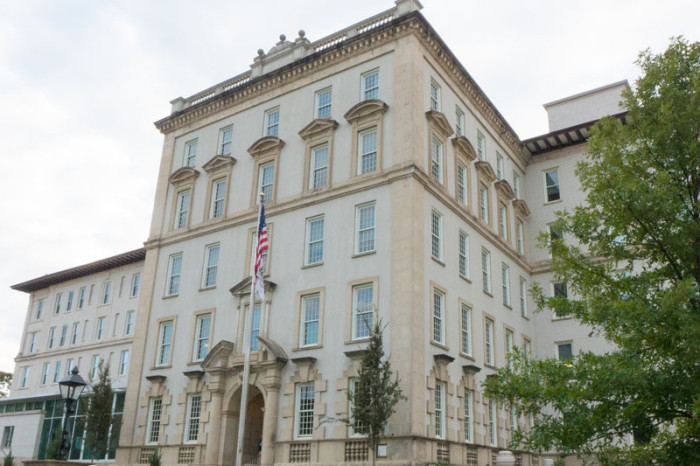
Emory doctors are collecting and transfusing plasma from virus survivors to infected patients as part of a new plan to combat the Ebola virus.
The Ebola Plasma Bank, a store of the light yellow component of blood taken from Ebola survivors, aims to treat infected patients with antibodies found in the plasma, which may neutralize the active virus in the patients’ blood, according to Dr. Anne Winkler, assistant professor of pathology and laboratory medicine at Emory and a principal investigator for the clinical trial of the plasma bank.
“There is no data to prove that it is efficacious,” Winkler said of the results of the plasma transfusions, but she added that the plasma is under an “active study of investigation.”
Winkler added that the plasma is used in conjunction with other treatment in the hopes of improving survival rates.
The primary treatment for Ebola patients at the moment is supportive care, including IV fluid and electrolyte management, Winkler said.
According to Winkler, the only requirement for a patient to receive a transfusion is that his or her blood type must be compatible with the blood type of the donor.
Since the first American Ebola patient, Dr. Kent Brantly, was taken to Emory University Hospital (EUH) in August 2014 from Liberia, EUH staff has been involved with developing strict protocols and treatment to reduce the number of Ebola infections.
Dr. Colleen Kraft, assistant professor of Pathology and Laboratory Medicine at Emory University and the trial’s clinical investigator, first introduced the idea of the plasma bank to Winkler in fall 2014.
Winkler said she could not disclose the month of the first collection so as to protect the patient’s identity.
According to Kraft, who helped to treat the first Ebola patients at EUH, she and other doctors had the idea of plasma transfusions but elicited Winkler’s help to “put all of the parts together” and legitimize the program.
The process of collecting the plasma itself can only be done once a survivor has fully recovered, Winkler said.
Winkler referred to the process of plasma collection as “apheresis”, where the survivors are hooked up to a machine that separates their blood into plasma component and red blood cells. The machine then returns the red blood cells to the survivor and stores the plasma. This process takes one and a half to two hours.
Winkler described the next step in the plasma collection, called INTERCEPT. According to Winkler, the Cerus Corporation, a biomedical products company and the official sponsor for this trial, provided the technology for this process, in which doctors are able to destroy any pathogens found in the plasma donations themselves.
These pathogens could include a number of diseases such as malaria, especially when the patients were in at-risk countries for such diseases before contracting Ebola.
The plasma is then stored at Emory for future use for up to a year under FDA standards.
Although all of the plasma is stored at EUH, transfusions are taking place all over the United States, according to Winkler. The first collection was at the University of Nebraska by Winkler and a colleague.
According to Winkler, after the first collection, the process grew immensely and the hospital saw a need to have products available. Since the start of this process in fall 2014, multiple patients in the United States have received the plasma transfusions, Winkler said.
When a patient is in need, a hospital will request the plasma from Emory, which will ship it over. Additionally, parallel studies are underway in Ebola-afflicted countries in West Africa, and plasma is being collected from their own survivors, Winkler said.
Winkler added that the hospital is working on a way to turn the plasma into powdered form to make it easier to store and ship.
“We hope that the plasma will be a successful therapy, but what we really hope is that the collection of plasma can be used for other things as well,” Winkler said.
She added that other investigators at Emory are looking to create a source of antibodies without collecting from survivors.
Although Emory has yet to produce its own Ebola antibodies, “it’s hopeful,” Winkler said.
According to Winkler, all donations by survivors are completely voluntary and unpaid.
“They donate on their own goodwill,” she said. Survivors can physically donate every 48 hours, but the hospital typically only collects when the survivors are in town.
When asked about the risk for the survivors in donating the plasma, Winkler replied that it is an extensive procedure involving punctures, risk of developing infection and possible numbness and discomfort.
That being said, she said that the process is safe for them to perform. Winkler explained that the protocol they use currently is Food and Drug Administration (FDA)-approved since December.
However, she added, the first transfusions that began in the fall had to be approved by the FDA each time a collection was made, through an emergency investigational new drug application.
According to Kraft, the act of collecting and transfusing plasma will prepare EUH for other future diseases that may require similar therapies.
“While I think that the threat of Ebola is waning and that things are getting better... we are learning a lot through this process and are hopefully developing a standard that can be applied to other diseases and help patients in West Africa,” Kraft said.
-By Naomi Maisel, Staff Writer
Read More
Trending





